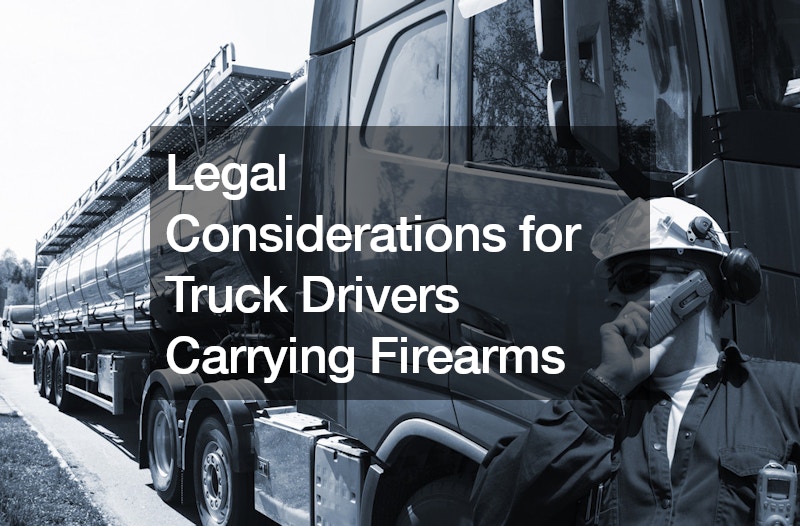Legal Considerations for Truck Drivers Carrying Firearms
Truck drivers, essential to the economy, encounter a myriad of challenges as they crisscross state lines transporting valuable cargo. Among these challenges is the fundamental need for personal protection while on the road. However, the ability of truck drivers to legally carry firearms in their vehicles is not straightforward, as it hinges largely on diverse state regulations rather than uniform federal statutes. This article delves into the intricate legal framework that governs whether and how truck drivers can carry firearms, aiming to clarify these complexities and offer practical guidance.
At the heart of the matter lies the fact that each state in the United States maintains its own laws regarding firearms possession and transport. Consequently, what may be permissible in one state could be strictly prohibited or subject to stringent conditions in another.
This variability poses a significant challenge for truck drivers whose routes span multiple states with differing regulations. Understanding and adhering to these laws are not only essential for legal compliance but also critical for ensuring the safety and security of both drivers and their cargo.
Understanding State Laws
One of the fundamental aspects of carrying a firearm as a truck driver is understanding the variances in state laws. Unlike federal regulations, which are limited in scope regarding personal defense firearms in commercial vehicles, state laws dictate whether and how truck drivers can carry firearms. Each state has its own set of rules concerning permits, reciprocity with other states, and specific regulations regarding where firearms can be transported and stored within a vehicle.
Federal Law and Safe Passage
In the absence of specific federal laws allowing or restricting truck drivers from carrying firearms, they must adhere to state regulations. However, there is a provision under federal law known as the Safe Passage provision (18 USC 926A). This provision allows individuals traveling between states to transport firearms through states with restrictive laws, provided the firearms are unloaded, locked, and inaccessible during the journey. This provision offers some level of protection when truck drivers are passing through states with stringent firearm laws.
State Carry Permits
To navigate the diverse state laws effectively, truck drivers are advised to obtain multiple state carry permits. A permit from their home state is essential, but obtaining non-resident permits from states along their routes can expand their legal ability to carry firearms. These permits vary in terms of reciprocity and recognition across different states, so it is crucial for truck drivers to research and comply with each state’s requirements where they plan to travel.
Legal Considerations When Using the Truck as Habitation
Many truck drivers spend extended periods on the road and may use their trucks as temporary living spaces. This raises additional legal considerations regarding the application of self-defense laws. Some states offer enhanced legal protections under their self-defense laws when a truck driver is using their vehicle as a dwelling. However, these protections also vary significantly from state to state, highlighting the importance of understanding the specific laws in each jurisdiction.
Military Installations and Federal Property
Truck drivers often encounter federal property and military installations during their routes. It’s important to note that firearms are generally prohibited on federal property unless expressly authorized. Military installations, in particular, have strict regulations regarding the possession of firearms on their premises. Truck drivers should contact these installations in advance to understand their policies and procedures for firearms possession and storage while on site.
Employer Policies and Considerations
While federal law does not prohibit truck drivers from carrying firearms in their vehicles (where permitted by state law), employers may have policies restricting or prohibiting firearms in company vehicles. Truck drivers should be aware that while carrying a firearm may not be a crime under state law, it could result in employment consequences, including termination or disciplinary action. Understanding and adhering to employer policies is essential to avoid potential legal and professional ramifications.
Pro Tip: Invoking the Safe Passage Provision
A valuable tip for truck drivers navigating through states with restrictive firearm laws is to invoke the Safe Passage provision under federal law. This provision allows truck drivers to transport firearms legally through states where they may not otherwise be allowed, provided they comply with specific requirements regarding storage and accessibility of firearms during travel.
Consulting with a Truck Driver Attorney
Given the complexity and variation in state laws regarding firearms, truck drivers facing legal questions or concerns should consider consulting with a truck driver attorney. These legal professionals specialize in understanding the intricacies of state firearm laws and can provide tailored advice and guidance to ensure compliance and mitigate risks associated with carrying firearms on the road.
Conclusion
In conclusion, truck drivers must navigate a patchwork of state laws when it comes to carrying firearms in their vehicles. Understanding these laws, obtaining necessary permits, and complying with employer policies are crucial steps to legally and safely carry a firearm while on the road. By staying informed and consulting with legal experts when needed, truck drivers can protect their rights and ensure they operate within the bounds of the law throughout their journeys.
.







